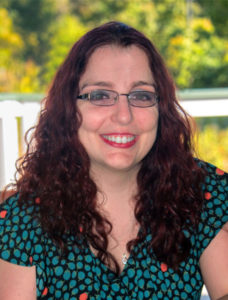As an individual on the autism spectrum, I have struggled with and achieved many types of independence, such as going to college, living on my own, learning how to cook, and starting my own business. While I did receive varying degrees of assistance with each of these endeavors, sexual independence was something I had to seek out and achieve on my own.
When it comes to the subject of sexuality and autism, parents and professionals alike tend to be nervous and uncomfortable. People on the autism spectrum are faced with so many other day-to-day challenges, such as problems at school or with peers, eating issues, disruptive sleep patterns, and sensory overload that talking about sex more often than not ends up on the back burner – if it gets discussed at all.

Amy Gravino
For me, growing up as an adolescent and now as an adult on the spectrum, learning how to take control of my own sexuality and having the ability to make informed decisions about sex has proved to be as valuable as any other skill I have learned, if not more so. I first began having crushes and developing an interest in boys around age 11, and my curiosity about sex heightened considerably just a few years later, at age 14. But I didn’t have my first kiss until I was 17 years old, and I had sex for the first time at 22.
A dearth of learning opportunities combined with a lack of access to information and low self-esteem that I had developed after years of bullying meant that when I did become sexually active, I was not able to fully advocate for myself. I believed that my inexperience meant that I was not allowed to do so, and I deferred to my partner in all circumstances – including assessing my own level of enjoyment. It was only as time went on and my self-confidence grew that this began to change.
As the author of the memoir The Naughty Autie and a national speaker on the subject of autism and sexuality, I often hear from parents about their fear, concern, bewilderment, and uncertainty over recognizing and supporting their child’s sexuality. Many flat out refuse to see their young adult child as a sexual being, thinking that if they ignore it, it will simply go away. But many others realize that this is not the case and are left struggling with a lack of strategies for how to talk to their child about sexuality.
These three steps can help parents to open a conversation about sexuality with their autistic child:
Get past the “blushing cheek” phase. As I mentioned previously, this is often a difficult topic for parents to broach, but if you are embarrassed or ashamed to speak honestly about sex, your child will feel the same way. Shame is not something that typically comes naturally to individuals with autism, and introducing it in the context of sex can and will cause more harm than good.
Find ways to discuss these issues at an age- and developmentally appropriate level. You don’t have to give every piece of information all at once, but waiting until your child is already at the point of wanting to be sexually active is waiting too long. Issues like physical boundaries, consent, and privacy can all be addressed at a young age.
Provide your child with information about sex. Knowledge is empowerment. Parents tend to think that if they give their child information about sex, they will want to have sex. In reality, having accurate, explicit, clear facts will allow individuals with autism to make smart, informed decisions about their sexual desires and well-being. The best way to prevent victimization among autistic people is to give us the opportunity to be empowered adults who have the ability to declare our own sexual independence.
Just as every individual on the spectrum is different, the process of becoming sexually independent is different for each person, and some strategies may be more effective than others. My own journey with sexuality is a continuing one, and though I have been heartbroken and made some questionable choices in my life, it is my mistakes that have helped me the most to grow and learn how to live in this world. Give your child a chance to experience their sexuality, love, and make mistakes, and they will be better for it.
Amy Gravino is a writer, national speaker, autism consultant, and college coach for individuals with autism. Amy is a Certified Autism Specialist and the founder of A.S.C.O.T. Coaching. For more information, please visit www.amygravino.com.





